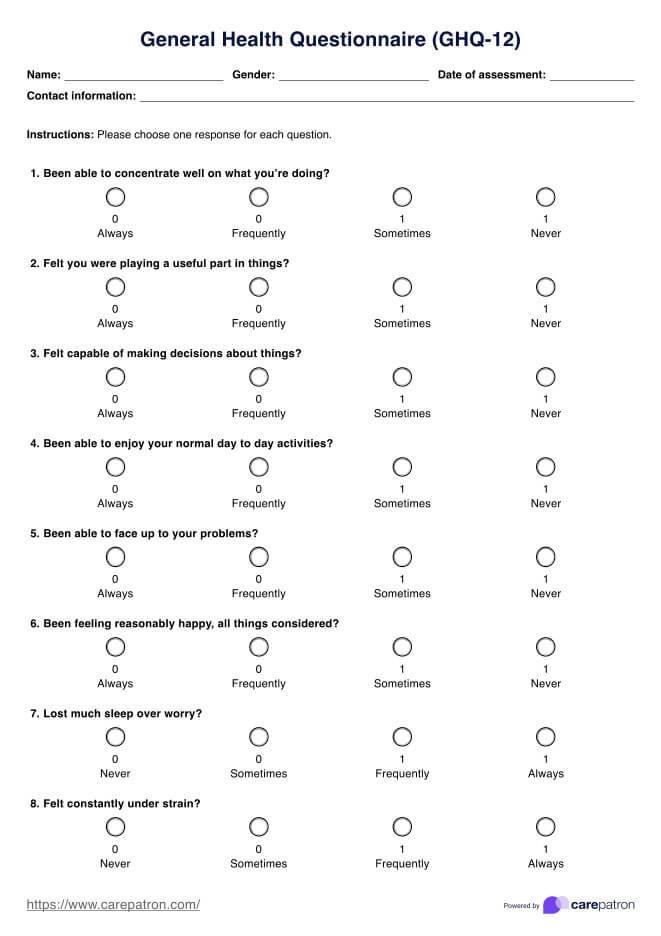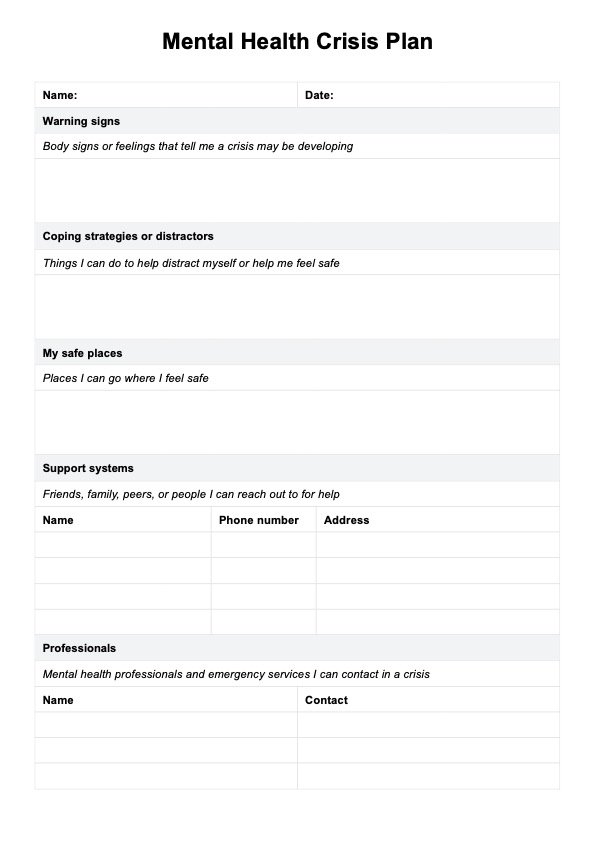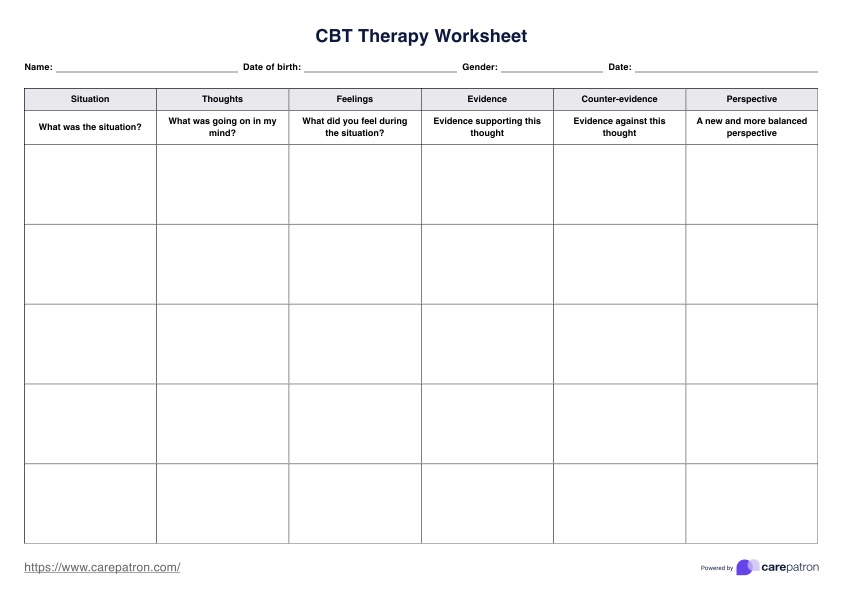Psychoeducational Group Worksheets
Unlock growth and self-awareness with Psychoeducational Group Worksheets, a valuable resource for therapy and personal development.


What is a Psychoeducational Group Worksheet?
A Psychoeducational Group Worksheet is a valuable resource used in psychology and mental health to facilitate group therapy sessions and psychoeducation programs. These mental health worksheets are designed to assist mental health professionals in providing structured and educational content to individuals or groups dealing with various psychological, emotional, or behavioral issues.
Typically, these worksheets are created by licensed therapists, counselors, or psychologists and are intended to guide participants through various topics and activities that promote self-awareness, emotional regulation, and the development of coping skills during group discussions in therapy. These resources can be integral to therapeutic interventions, as they offer a structured format for discussions and exercises that encourage personal insight and growth.
The content of these worksheets may cover a wide range of subjects, including but not limited to:
- Coping strategies: Teaching individuals effective techniques to manage stress, anxiety, or depression so they don't fall victim to negative self-talk and other unhelpful activities or behaviors.
- Communication skills: Improving interpersonal relationships by enhancing communication and conflict resolution skills.
- Emotional regulation: Helping participants recognize and manage their emotions in healthy ways.
- Self-esteem and self-awareness: Promoting a positive self-image and understanding one's thoughts and feelings.
- Goal setting: Assisting individuals in setting and achieving personal and therapeutic goals based on their own ideas and insights gained from other members of the group.
- Psychoeducation: Providing information about specific mental health conditions, symptoms, and treatment options.
These worksheets often include fill-in-the-blank exercises, reflection prompts, and structured activities that encourage participants to engage actively in learning. They serve as a tool for therapists and clients to track progress, identify areas for improvement, and foster a deeper understanding of the therapeutic concepts discussed during group sessions, all of which can lead to improved mental well-being for those attending such sessions.
Looking for other Group Therapy resources? Feel free to watch the video below:
Psychoeducational Group Worksheets Template
Psychoeducational Group Worksheets Example
How does it work?
Utilizing a printable Psychoeducational Group Worksheet involves a series of steps:
Step 1: Preparation
Download and print the worksheet from a trusted source. Gather writing materials. Then, choose a comfortable, quiet workspace, ideally in group therapy or under professional guidance.
Step 2: Introduction
Introduce the worksheet's topic and objectives. Clarify participants' expectations.
Step 3: Read and understand
Carefully review the worksheet's instructions and questions. Ensure participants comprehend the exercise's purpose.
Step 4: Individual work
Participants complete the worksheet individually. Encourage honest, reflective responses. Tasks may include filling in information, reflecting on emotions, or setting goals.
Step 5: Group discussion
In group therapy, participants share their responses and insights. Facilitate discussion for mutual learning. The facilitator may ask open-ended questions to delve deeper into the topic.
Step 6: Reflection
Allow participants time to reflect on their experiences. Foster self-awareness and insights gained during the exercise.
Step 7: Goal setting (if applicable)
Guide participants in setting SMART goals if the worksheet includes goal-setting. Discuss strategies for goal achievement.
Step 8: Closing remarks
Summarize key takeaways. Emphasize real-life application of insights. Offer supplementary resources if relevant.
Step 9: Documentation
Document and store completed worksheets in therapy records. You can use them for progress tracking and future therapy planning.
These steps transform a printable Psychoeducational Group Worksheet into a potent tool for self-reflection, learning, and personal growth in therapy. It encourages engagement, discussion, and self-improvement, providing a structured framework for mental health support.
When would you use this Worksheet?
Psychoeducational Group Worksheets are versatile tools that can benefit various practitioners and participants in mental health and personal development. Here are some scenarios and contexts in which using these worksheets is highly appropriate:
- Group therapy sessions: Psychoeducational Group Worksheets are ideal for structured group therapy settings. They facilitate discussions, encourage self-reflection, and help participants understand their emotions and behaviors. Topics can range from anxiety management to improving self-esteem.
- Psychoeducation programs: Mental health professionals, educators, and counselors can employ these worksheets in psychoeducational programs. These programs aim to educate individuals about mental health conditions, coping strategies, and emotional well-being.
- Support groups: These worksheets can benefit support groups for various issues, such as addiction recovery, grief, or trauma. They foster community and provide participants with practical tools to navigate their challenges.
- Individual therapy: Psychoeducational Group Worksheets can also be adapted for individual therapy sessions. Therapists use them to delve deeper into specific issues or to set personalized goals.
- Workshops and seminars: Facilitators conducting workshops or seminars on personal development, stress management, or communication skills can integrate these worksheets. They enhance engagement and provide attendees with actionable takeaways.
- Schools and educational settings: School counselors and educators can utilize psychoeducational worksheets to address students' emotional well-being. Topics may include bullying, peer pressure, or resilience.
- Employee assistance programs (EAPs): EAP professionals can incorporate these worksheets into workplace programs to support employees' mental health and stress management.
- Self-help and self-improvement: Individuals seeking personal growth and self-improvement can also benefit from these worksheets. They provide structured guidance for introspection and skill development.
Benefits
Structured learning
These worksheets offer a structured format for learning and self-reflection, making it easier for participants to engage with the material effectively.
Facilitates communication
In group settings, these worksheets encourage open communication among participants, fostering a sense of community and support.
Promotes self-awareness
These worksheets promote self-awareness by prompting individuals to reflect on their thoughts and emotions, which is essential for personal growth and emotional regulation.
Versatile topics
Free Psychoeducational Group Worksheets cover various topics, from stress management to interpersonal skills, making them adaptable to therapeutic and educational contexts.
Empower participants
Participants gain a sense of empowerment as they actively engage in the learning process, set goals, and develop strategies to address their challenges.
Enhances therapeutic progress
Mental health professionals can use these worksheets to track clients' progress, tailor therapy sessions, and assess the effectiveness of interventions.
Accessibility and cost-efficiency
Free worksheets online make them accessible to a broader audience, including individuals with limited resources, making mental health support more inclusive.
Self-help and independence
Individuals can use these worksheets for self-help and self-improvement, fostering independence in managing their mental well-being.
Incorporating free Psychoeducational Group Worksheets into therapeutic settings and educational programs can improve emotional well-being, enhance communication, and increase participant empowerment. These resources offer valuable support for practitioners and individuals seeking to understand and manage their psychological challenges effectively.
Commonly asked questions
Psychoeducational Group Worksheets are used by mental health professionals, educators, counselors, therapists, support groups, and individuals seeking self-improvement.
They are used in group therapy sessions, psychoeducation programs, support groups, workshops, schools, and workplaces to address various mental health and personal development topics.
These worksheets facilitate structured learning, encourage self-reflection, and promote discussion. Participants fill them out individually and often share their responses in a group setting, fostering communication and self-awareness.


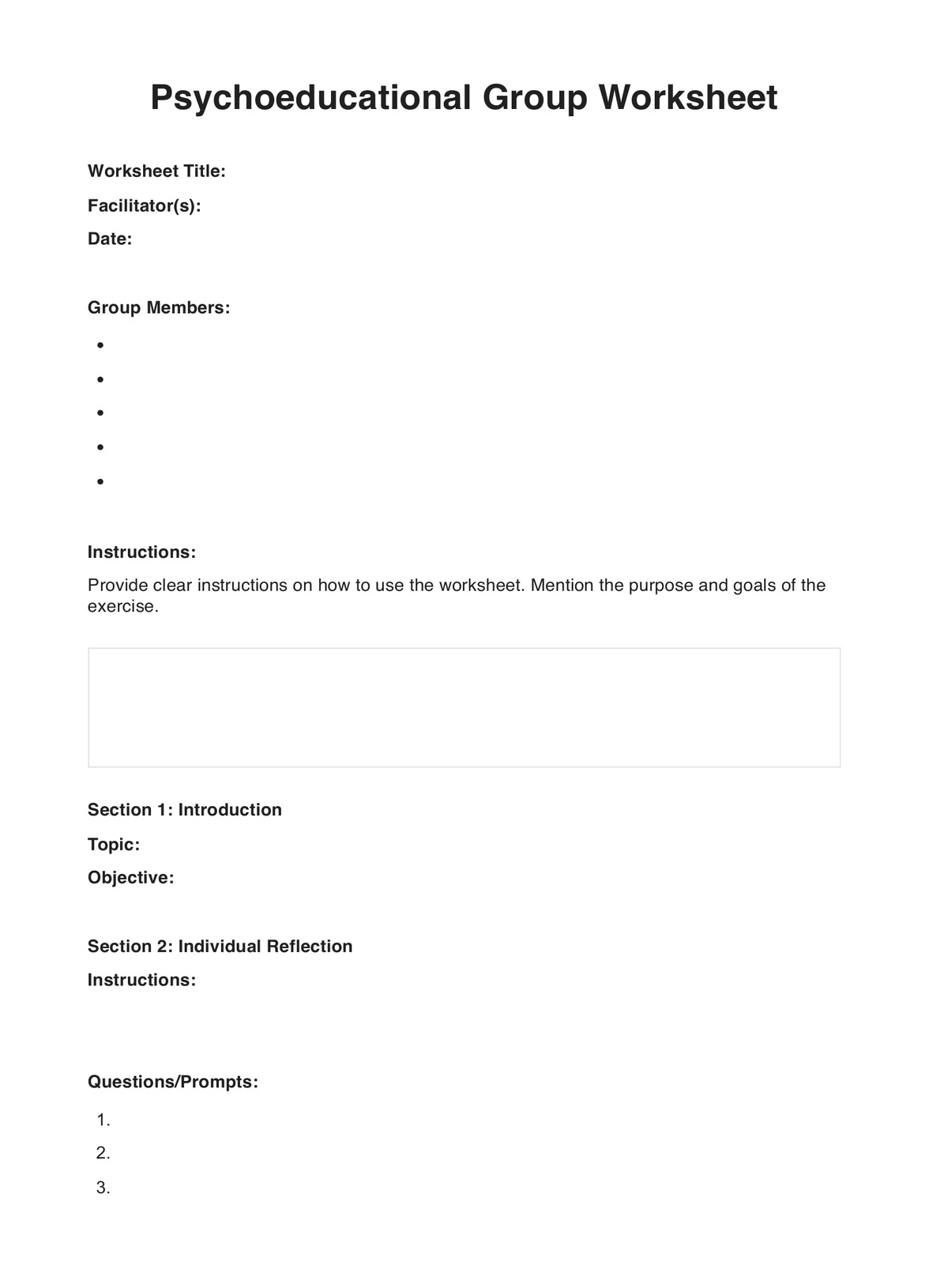
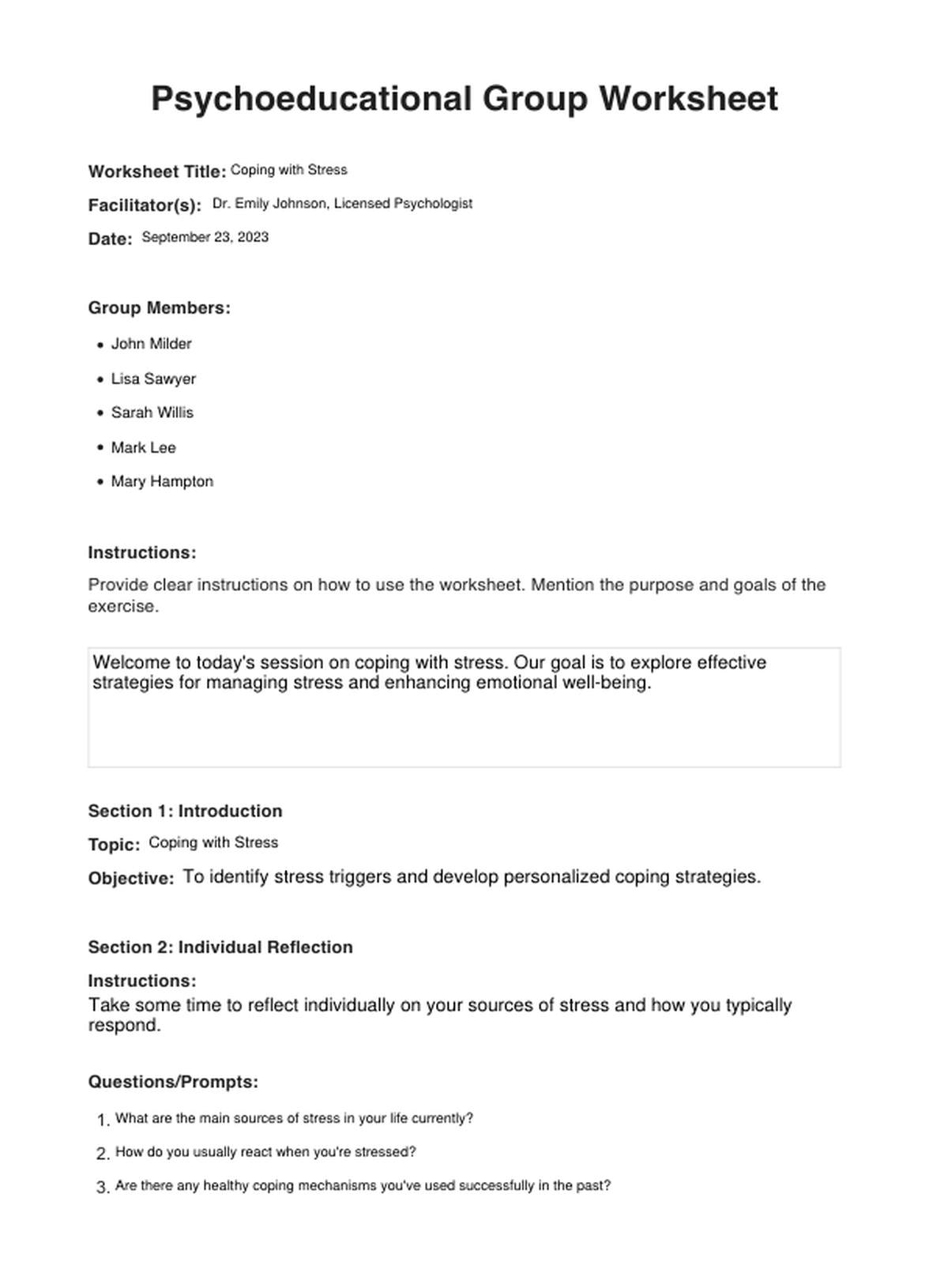















-template.jpg)






















































































